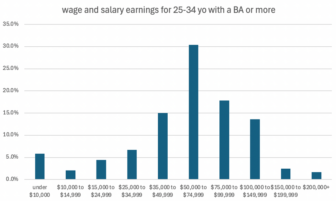Terrific Inc. column by University of Michigan Ross Business School professor Jeff DeGraff entitled It’s the Talent Stupid. DeGraff makes the case that low tax states and regions do not have the best economies. Rather it is those who have the best talent.
We are now living in an economy where talent is the asset that matters most to enterprise success. And that enterprises increasingly locate and invest in those communities which have the greatest human capital.
DeGraff writes: The traditional argument is that lower tax rates attract the best companies. But the numbers suggest otherwise.
The states with the highest amount of venture capital per person, which is an indicator of growth potential, are California, Massachusetts, and New York. These are also among the top tier of places with the biggest state and local tax rates. So why are all these giant, multinational companies with tons of moving parts and pieces moving to these expensive locales?
It turns out that all three states are also among the very top tier of higher education rates. The people who live in these places are more likely to have graduate degrees than their peers elsewhere, and the states themselves are abundant with elite research universities and institutes. Additionally, they have diverse and multi-cultural populations with global perspectives on all issues. This is becoming especially important because these multinational companies are making more and more of their profits in countries outside of the U.S.
The trend goes beyond these three states. Forbes’ list of the most-educated American cities are disproportionately college towns with significantly higher employment rates and far better paying jobs than the rest of their surrounding regions. While some of these jobs are associated with academic institutions, most of them are with companies that have built around these areas to get talent.
It’s an indisputable fact: organizations locate in places where top talent is readily available. People want to live in these areas because of access to culture and education. Furthermore, these spots are typically more inclusive than other locales because they’ve historically welcomed people from all over the world and embraced a multiplicity of worldviews.
Ann Arbor, by the way, is ranked #1 on the Forbes list.
As we have written frequently (see this 2010 post and this from 2014) what matters is what you get from higher taxes. The places with the strongest economies are those that combine high quality education systems and high quality of place that retains and attracts mobile talent. (And, as DeGraff mentions, they are also welcoming to all.) Both education and placemaking require public investments.
That is why Michigan Future’s first ever policy agenda will emphasize building and investing in a education system from birth through higher education that will prepare all Michigan kids for a 21st Century economy and building and investing in high-amenity, welcoming communities that are places where talent wants to live and work.







